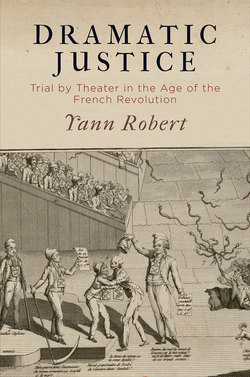Dramatic Justice

Реклама. ООО «ЛитРес», ИНН: 7719571260.
Оглавление
Yann Robert. Dramatic Justice
Отрывок из книги
Dramatic Justice
Trial by Theater in the Age of the French Revolution
.....
Together, these chapters offer a fuller understanding of the famously militant theater of the Revolution and of the rise of the Terror by situating them within a wider historical evolution in the performance of justice, instead of treating them as anomalies resulting from an extreme politicization of the arts and the law. The value of this approach is particularly evident with respect to Revolutionary drama. For centuries, the latter was either ignored by scholars, because they struggled to reconcile it with the standard history of French theater, or was reduced to a simple illustration of the vicissitudes and excesses of Revolutionary politics.37 Starting in the 1980s, studies on Revolutionary drama grew in both number and subtlety—giving rise to fascinating debates, notably between those who, like Susan Maslan, see the theater of the Revolution as a powerful site and symbol of direct democracy and those who, like Friedland, believe it illustrates a conception of representation that silences the people—yet even these studies largely retain a political lens.38 Having grown dull from repeated use, this lens risks blinding us to other aspects of Revolutionary drama, notably by reinforcing the traditional perception of it as the product of a unique political moment, disconnected from the dramatic theories and practices that preceded it. In response, some scholars have recently begun to examine its links to the ancien régime. For instance, Cecilia Feilla has shown the importance of bourgeois drama and sentimental tropes in the theater of the Revolution, thereby adding to the more quantitative studies that first revealed the continued popularity of ancien régime plays and genres.39 Yet what of the more topical plays, many of which were significant causes célèbres at the time, remain to this day the best (and often only) known dramatic works of the Revolution, and are therefore so central to our understanding of Revolutionary theater?40 For them, the old answer persists—that they arose ex nihilo, the accidental offspring of an obsession with politics that turned everything it touched into propaganda.41
By contrast, this book seeks to draw attention to the continuity in dramatic theory and praxis pre- and post-storming of the Bastille.42 Once inscribed in the broader history of judicial theater, the overt topicality of many of the Revolution’s most consequential plays no longer appears to be the sign of an aberrant politicization. The same holds true for some of the most striking anecdotes from the period, ranging from actors tried and even executed for words they said while in character, to spectators watching their own lives reenacted, such as Anne Calas, who, if she truly attended one of the five plays about her family’s trial staged in 1791, saw her father convicted and dragged to the scaffold twice. Indeed, while some of these consequential plays and dramatic anecdotes are clearly political in nature, many are not. What they all share, however, is a ritualistic vision of the theater as a mode of action on the present, made possible by its explicit reenactment of current events. By moving beyond the usual emphasis on politics, both as the supposed origin of Revolutionary drama’s topicality and as the best lens for understanding it, this book offers a new perspective on the theater of the Revolution, viewing it not as an anomaly but as the result of an artistic and intellectual evolution that set the stage for a new judicial practice of the theater.
.....